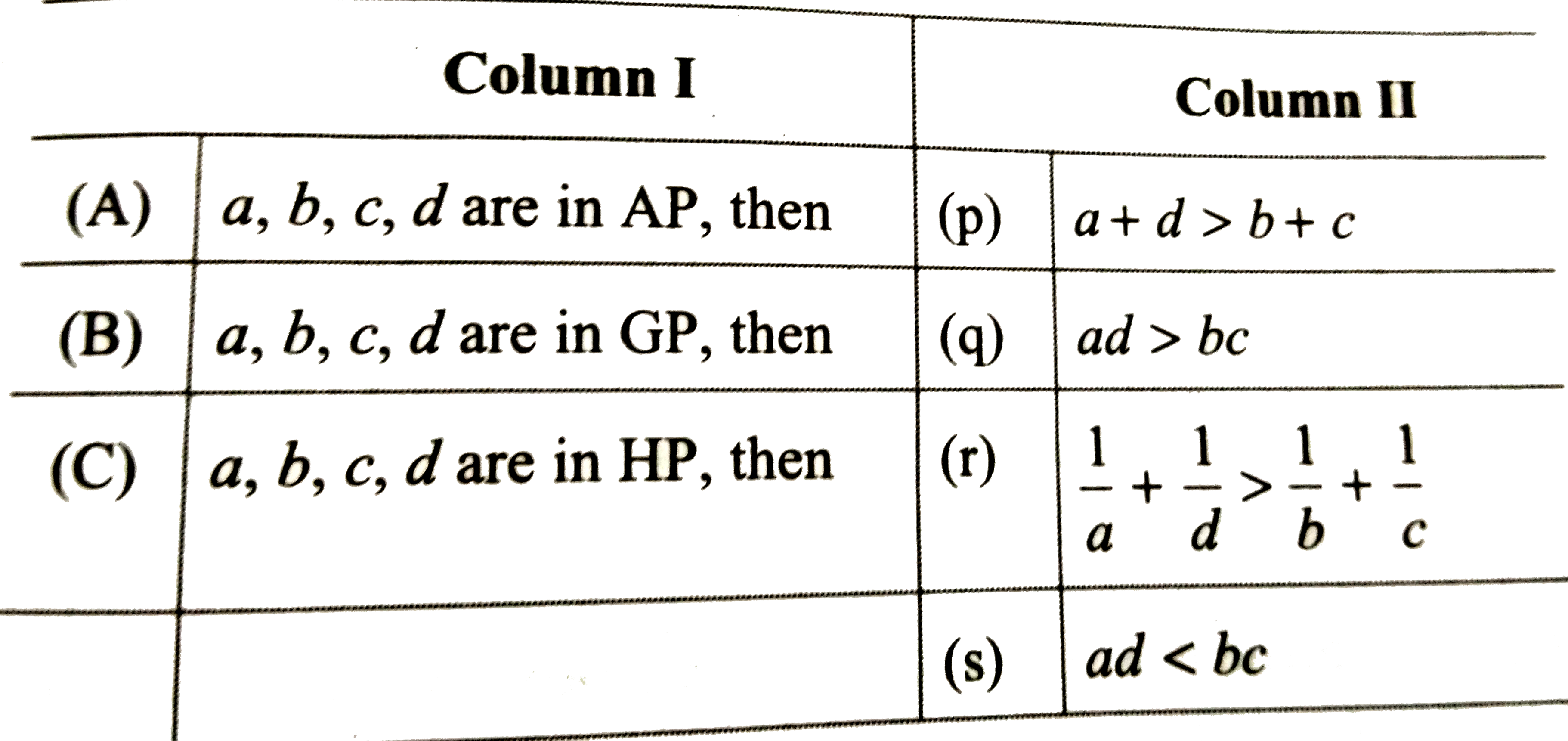Suppose p is the first of n(n>1) arithmetic means between two positive numbers a and b and q the first of n harmonic means between the same two numbers.
The value of p is
na+bn+1
nb+an+1
na−bn+1
nb−an+1
The correct Answer is:A
To find the value of p, which is the first of n arithmetic means between two positive numbers a and b, we can follow these steps:
1. Understanding the Arithmetic Means:
- When we insert n arithmetic means between a and b, we have the sequence:
a,a1,a2,…,an,b
- Here, a1 is the first arithmetic mean, which we denote as p.
2. Common Difference:
- The common difference d between consecutive terms in an arithmetic sequence can be calculated using the formula:
d=b−an+1
- This formula arises because there are n+1 intervals created by n means between a and b.
3. Finding p:
- The first arithmetic mean p can be expressed as:
p=a+d
- Substituting the value of d:
p=a+b−an+1
4. Simplifying the Expression:
- To combine the terms, we can rewrite p:
p=a+b−an+1=(n+1)a+(b−a)n+1
- This simplifies to:
p=na+bn+1
Final Answer:
Thus, the value of p is:
p=na+bn+1
- When we insert n arithmetic means between a and b, we have the sequence:
a,a1,a2,…,an,b
- Here, a1 is the first arithmetic mean, which we denote as p.
- The common difference d between consecutive terms in an arithmetic sequence can be calculated using the formula:
d=b−an+1
- This formula arises because there are n+1 intervals created by n means between a and b.
- The first arithmetic mean p can be expressed as:
p=a+d
- Substituting the value of d:
p=a+b−an+1
- To combine the terms, we can rewrite p:
p=a+b−an+1=(n+1)a+(b−a)n+1
- This simplifies to:
p=na+bn+1
Thus, the value of p is:
p=na+bn+1
Topper's Solved these Questions
- SEQUENCES AND SERIESBOOK - ARIHANT MATHS ENGLISHCHAPTER - SEQUENCES AND SERIESEXERCISE - Exercise (Single Integer Answer Type Questions)
10 Videos
- SEQUENCES AND SERIESBOOK - ARIHANT MATHS ENGLISHCHAPTER - SEQUENCES AND SERIESEXERCISE - Exercise (Matching Type Questions)
3 Videos
- SEQUENCES AND SERIESBOOK - ARIHANT MATHS ENGLISHCHAPTER - SEQUENCES AND SERIESEXERCISE - Exercise (More Than One Correct Option Type Questions)
15 Videos
- PROPERTIES AND SOLUTION OF TRIANGLES BOOK - ARIHANT MATHS ENGLISHCHAPTER - PROPERTIES AND SOLUTION OF TRIANGLES EXERCISE - Exercise (Questions Asked In Previous 13 Years Exam)
21 Videos
- SETS, RELATIONS AND FUNCTIONS BOOK - ARIHANT MATHS ENGLISHCHAPTER - SETS, RELATIONS AND FUNCTIONS EXERCISE - Exercise (Questions Asked In Previous 13 Years Exam)
12 Videos
Similar Questions
Let a,b,c,d be positive real numbers with a<b<c<d. Given that a,b,c,d are the first four terms of an AP and a,b,d are in GP. The value of adbc is pq, where p and q are prime numbers, then the value of q is _____
View SolutionMatch the following Column I to Column II

View SolutionFor a positive integer n let a(n)=1+12+13+14+.....+1(2n)−1. Then a(100)≤100 b. a(100).>100 c. a(200)≤100 d. a(200)≤100
View SolutionIn a triangle XYZ, let x, y, z be the lengths of sides opposite to the angles X, Y, Z, respectively, and 2s = x + y + z. If s−x4=s−y3=s−z2 of incircle of the triangle XYZ is 8π3
View SolutionLet R={(3,3),(6,6),(9,9),(6,12),(3,9),(3,12),(12,12),(3,6)} is a relation on set A={3,6,9,12} then R is a) an equivalence relation b) reflexive and symmetric only c) reflexive and transitive only d) reflexive only
View SolutionIf p is the first of the n arithmetic means between two numbers and q be the first on n harmonic means between the same numbers. Then,show that q does not lie between p and ((n+1)/(n-1))^(2)p
View SolutionLet 'n' Arithmetic Means and 'n' Harmonic Means are inserted between two positive number a' and 'b'. If sum of all Arithmetic Means is equal to sum of reciprocal all Harmonic means,then product of numbers is
View SolutionIf A is the arithmetic mean and p and q be two geometric means between two numbers a and b, then prove that :
p3+q3=2pq A
View SolutionG is the geometric mean and p and q are two arithmetic means between two numbers a and b, prove that :
G2=(2p−q)(2q−p)
View SolutionGiven that n arithmetic means are inserted between two sets of numbers a,2b, and 2a,b where a,b, ∈R. Suppose further that mth mean between these two sets of numbers are same, then the ratio a:b equals
View SolutionLet p(>0) be the first of the n arthimatic means betweens between two numbers and q(>0) the first of n harmonic means between the same numbers. Then prove that
q∉(p,(n+1n−1)2p)andp∉((n−1n+1)2q,q)
View Solutionदो संख्याओं a और b के बीच एक समान्तर माध्य A और दो गुणोत्तर माध्य p और q हैं, तो सिद्ध कीजिए कि
p3+q3=2pqA
View SolutionIf A be the arithmetic mean between two numbers and S be the sum of n arithmetic means between the same numbers, then -
View Solutionयदि A दो संख्याओं का समान्तर माध्य हो और S, उन दो संख्याओं के बीच n समान्तर माध्यों का योग क्या होगा?
View SolutionIf p is the first of the n arithmetic means between two numbers and q be the first on n harmonic means between the same numbers. Then, show that q does not lie between p and (n+1n−1)2p.
View SolutionLet p(>0) be the first of the n arthimatic means betweens between two numbers and q(>0) the first of n harmonic means between the same numbers. Then prove that
q∉(p,(n+1n−1)2p)andp∉((n−1n+1)2q,q)
View Solution
